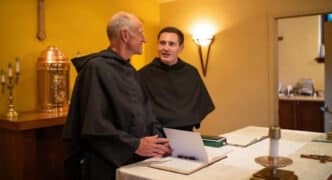The other day, we had a heck of a time getting to Mass. The boring details included three cars, a sick kid, a kid who got sick in a different way on the way to Mass, and multiple texts and multiple trips back and forth to pick up stragglers.
When I was finally headed back to Mass with one final kid, I said I hoped we would make it on time. I had been taught you have to be at Mass for the Gospel reading for it to count as fulfilling your Sunday observation.
“Kind of a weird thing to have a rule about,” the kid said.
I said, “Well, it’s because if they don’t make a rule, people will pull some kind of nonsense like sticking their heads in the door for a minute, and saying they technically went to Mass.”
I told her that, when I was little, I had heard that you couldn’t spend a dollar bill if more than half of it were missing; so I spent a clownishly long time trying to work out how I could cut a bill in two in such a way that each part would be bigger than half, so I could spend them both. (Yes, I was kind of a dumb kid.) I wasn’t thinking about it having some particular value; I just wanted to get away with something.
Well, when we got to the Mass, it was almost the end of the sermon. We didn’t make it in time. And then yet another kid bailed out for complicated reasons, and my husband went to check on her, and the upshot is that very few Fishers were truly at Mass for very long at all.
Did it count?
The more I thought about it, the less it made sense that I could tell by looking at the clock whether or not we had fulfilled our obligation. It is a true obligation, and obligations come with rules; and yet it didn’t feel right to be looking for a rule that had nothing to do with our intentions. So I looked it up and discovered that in fact there is no “cut off” time that makes it “count” or not.
The rule, such as it is, seems to be: “All of the Mass is very good and very important, so get to Mass every Sunday and Holy Day of Obligation unless you can’t; and be there for all of it, unless you can’t.”
I thought about it some more. (I am still kind of dumb, to be honest.)
I thought, when I was little, I couldn’t solve the riddle of the magically doubling dollar bill because the rules of geometry and the rules against counterfeiting are both pretty inflexible. They have to be, because they were made to protect something that is, in itself, perilously close to nothing. A dollar is just a piece of paper; it’s just an idea in the mind of an economist. It needs rules to make it actually be something. The rules are like an exoskeleton helping to define an amorphous blob.
But the Mass is nothing like that, in any way. And the reason it has rules is for entirely different reasons.
You could say the Mass is finite, in that it takes place within a certain period of time, in a certain space, using certain materials, and yes, following certain rules. But it’s also a place where heaven meets earth, literally. The divine and the human, the spiritual and the material, the infinite and the temporal, the dangerous and the profoundly generous — all converge in the Eucharist. And there is no such thing as a consecrated host that is less than half Jesus. Every crumb is all him. Which is why we have rules about how to handle a consecrated host.
Being there
Which leads us back to the idea of “how much does it have to be to count?”
If we’re talking about a dollar bill, it has to be more than 50%, which you can measure with a ruler.
If we’re talking about the Mass, it has to be as much as you can manage, which you can discern with your own conscience.
If we’re talking about the Eucharist, it just has to exist, as far as I can tell. If it’s there, it’s fully there; and if it’s fully there, it’s there in a way that’s incomprehensibly huger than we have the capacity to comprehend. It’s fully there even if not even one single person in the pew agrees on its value. It’s just not that kind of thing that can be diminished or counterfeited. It can be ignored or disrespected, but that doesn’t change the immutably intrinsic value of what it is. It doesn’t merely represent God, it IS God. It’s the kind of thing that is not like anything else in the world.
And the reason there are rules about it — and there are a lot of rules! — are to help us see its intrinsic value, because we’re all kind of dumb, to be honest, and we need help. We need the exoskeleton of rules to help our amorphous, unworthy selves become formed into a house under whose roof Jesus may enter.
The Mass isn’t a business meeting that you can get notes on later. It’s a rendezvous with your beloved. The rules around how to celebrate and attend Mass are not to protect the Mass; they are to protect you from your own stupidity and laziness and weakness and carelessness, and they are there to invite you to something you can’t even comprehend, and yet you can trust you are wanted.
Sometimes it really is a sacrifice to be at Mass. It’s hard when you have unruly kids to wrangle; it’s hard when you didn’t wake up feeling amazing. It’s hard when it’s hot, when the music is terrible, or when you don’t like the other people in the pews. It’s hard when you’re mad at God, or you think maybe God is mad at you. You are never once commanded to be cheerful or peaceful or full of wonder and delight while you are at Mass! But you are commanded to try to be there, for all of it, if you can. It’s not that Jesus won’t come to us unless we follow the rules; it’s that they help us turn into something that can withstand being visited by Jesus. The rules are there to help you learn how to break out of a finite world that needs rules to hold it together, and to learn how to live forever.








